日一般疑问句和特殊疑问句讲解及练习测试
2021年中考语法复习:特殊疑问句+一般疑问句讲解及提升练习(有答案)

中考语法复习:特殊、一般疑问句的讲解及提升练习一、定义特殊疑问句:是对句子中某一特定部分提问,由疑问代词what,who,whom,whose,which或疑问副词where,when,why,how等引导.不可以用Yes或No回答.二、结构:其结构是:疑问词+一般疑问句?What did you do? Whose glasses are these?What color is your pet dog? Who can answer the question?三、用法:◆补充1:“How + 形容词+...?”与“What's the + 名词+ of ...?”,对重量、长度、高度、宽度、深度、速度、面积等提问,二者意思相同。
eg:How heavy is that basket of apples? = What's the weight of that basket of apples?【注意】与what 句式转换时,how 后的形容词heavy, wide, high, tall, deep, long, fast, large等,须分别转换成对应的名词:weight, width, height, depth, length, speed, size等。
其中How tall are you?=What's your height?eg:How heavy/how big/ how tall/ how high/ how large等可依据形容词的意思译为“多...?”。
How high is the big mountain?=What's the height of the mountain?How large is your new house? = What's the sizet of your new house?◆补充2:what be the date对具体日期(月、日)提问。
英语一般疑问句和特殊疑问句的讲解及练习
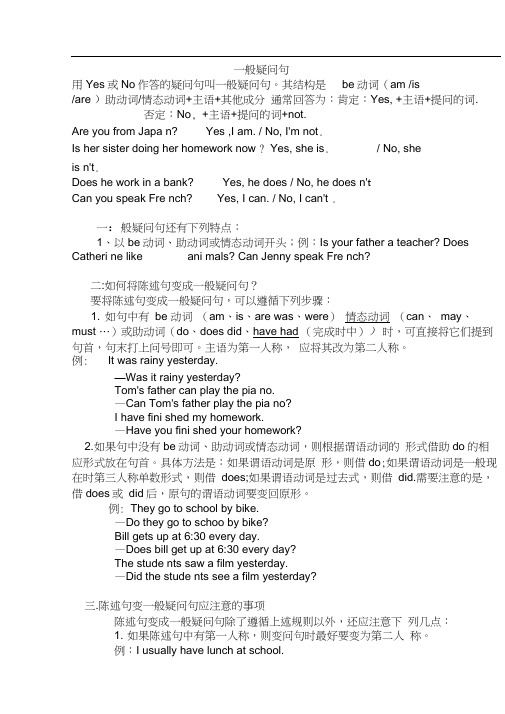
一般疑问句用Yes或No作答的疑问句叫一般疑问句。
其结构是be动词(am /is/are )助动词/情态动词+主语+其他成分通常回答为:肯定:Yes, +主语+提问的词.否定:No, +主语+提问的词+not.Are you from Japa n? Yes ,I am. / No, I'm not.Is her sister doing her homework now ? Yes, she is. / No, sheis n't.Does he work in a bank? Yes, he does / No, he does n'tCan you speak Fre nch? Yes, I can. / No, I can't .一:般疑问句还有下列特点:1、以be动词、助动词或情态动词开头;例:Is your father a teacher? Does Catheri ne like ani mals? Can Jenny speak Fre nch?二:如何将陈述句变成一般疑问句?要将陈述句变成一般疑问句,可以遵循下列步骤:1. 如句中有be 动词(am、is、are was、were)情态动词(can、may、must …)或助动词(do、does did、have had (完成时中))时,可直接将它们提到句首,句末打上问号即可。
主语为第一人称,应将其改为第二人称。
例: It was rainy yesterday.—Was it rainy yesterday?Tom's father can play the pia no.—Can Tom's father play the pia no?I have fini shed my homework.—Have you fini shed your homework?2. 如果句中没有be动词、助动词或情态动词,则根据谓语动词的形式借助do的相应形式放在句首。
一般疑问句和特殊疑问句_讲解及练习
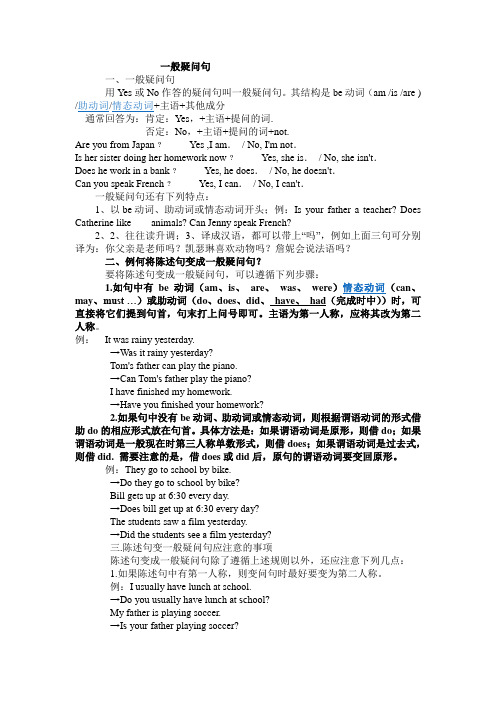
一般疑问句一、一般疑问句作答的疑问句叫一般疑问句。
其结构是be动词(am /is /are )主语+其他成分Yes,+主语+提问的词.否定:No,+主语+提问的词+not.Are you from Japan﹖Yes ,I am./ No, I'm not.Is her sister doing her homework now﹖Yes, she is./ No, she isn't.Does he work in a bank﹖Yes, he does./ No, he doesn't.Can you speak French﹖Yes, I can./ No, I can't.一般疑问句还有下列特点:1、以be动词、助动词或情态动词开头;例:Is your father a teacher? Does Catherine like animals? Can Jenny speak French?2、2、往往读升调;3、译成汉语,都可以带上“吗”,例如上面三句可分别译为:你父亲是老师吗?凯瑟琳喜欢动物吗?詹妮会说法语吗?二、例何将陈述句变成一般疑问句?要将陈述句变成一般疑问句,可以遵循下列步骤:1.如句中有be 动词(am、is、are、was、were can、may、must …)或助动词(do、does、did、have、had(完成时中)直接将它们提到句首,句末打上问号即可。
主语为第一人称,应将其改为第二人称。
例:It was rainy yesterday.→Was it rainy yesterday?Tom's father can play the piano.→Can Tom's father play the piano?I have finished my homework.→Have you finished your homework?2.如果句中没有be动词、助动词或情态动词,则根据谓语动词的形式借助do的相应形式放在句首。
小学英语一般疑问句和特殊疑问句(附练习题)
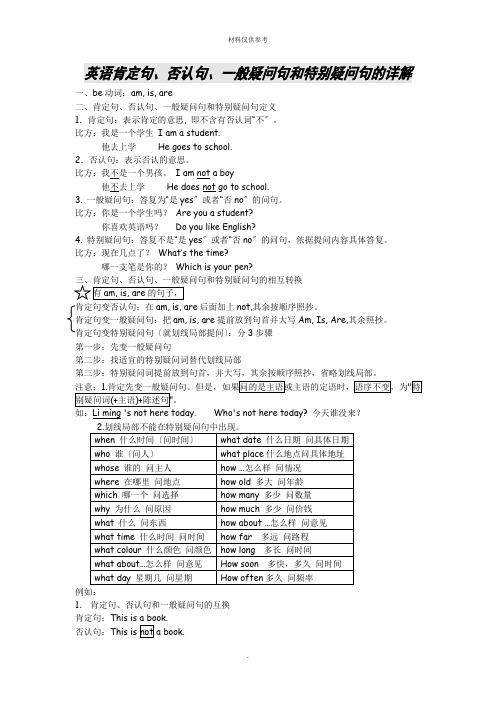
英语肯定句、否认句、一般疑问句和特别疑问句的详解一、be动词:am, is, are二、肯定句、否认句、一般疑问句和特别疑问句定义1.肯定句:表示肯定的意思, 即不含有否认词“不〞。
比方:我是一个学生I am a student.他去上学He goes to school.2.否认句:表示否认的意思。
比方:我不是一个男孩。
I am not a boy他不去上学He does not go to school.3. 一般疑问句:答复为“是yes〞或者“否no〞的问句。
比方:你是一个学生吗?Are you a student?你喜欢英语吗?Do you like English?4. 特别疑问句:答复不是“是yes〞或者“否no〞的问句,依据提问内容具体答复。
比方:现在几点了?What’s the time?哪一支笔是你的?Which is your pen?am, is, are后面加上not,其余按顺序照抄。
肯定句变一般疑问句:把am, is, are提前放到句首并大写Am, Is, Are,其余照抄。
:分3步骤第一步:先变一般疑问句第二步:找适宜的特别疑问词替代划线局部第三步:特别疑问词提前放到句首,并大写,其余按顺序照抄,省略划线局部。
如:Li ming 's not here today.Who's not here today? 今天谁没来?例如:1.肯定句、否认句和一般疑问句的互换肯定句:否认句:一般疑问句:Is this a book?肯定答复:Yes, it is.否认答复:No, it isn’t.2.就划线局部提问(变特别疑问句)This is a book.第一步:变一般疑问句Is this a book?第二步:找适宜的特别疑问词Is this what ?第三步:特别疑问词提前放到句首,并大写,其余按顺序照抄,省略划线局部。
do not或者does not,其余按顺序照抄动词用原形肯定句变一般疑问句:在句首加do或者does并大写,其余照抄。
小学英语一般疑问句和特殊疑问句(附练习题)
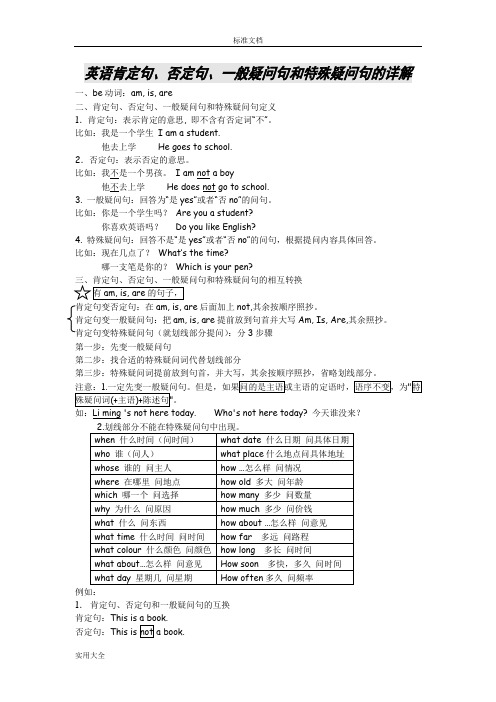
英语肯定句、否定句、一般疑问句和特殊疑问句的详解一、be动词:am, is, are二、肯定句、否定句、一般疑问句和特殊疑问句定义1.肯定句:表示肯定的意思, 即不含有否定词“不”。
比如:我是一个学生I am a student.他去上学He goes to school.2.否定句:表示否定的意思。
比如:我不是一个男孩。
I am not a boy他不去上学He does not go to school.3. 一般疑问句:回答为“是yes”或者“否no”的问句。
比如:你是一个学生吗?Are you a student?你喜欢英语吗?Do you like English?4. 特殊疑问句:回答不是“是yes”或者“否no”的问句,根据提问内容具体回答。
比如:现在几点了?What’s the time?哪一支笔是你的?Which is your pen?am, is, are后面加上not,其余按顺序照抄。
肯定句变一般疑问句:把am, is, are提前放到句首并大写Am, Is, Are,其余照抄。
:分3步骤第一步:先变一般疑问句第二步:找合适的特殊疑问词代替划线部分第三步:特殊疑问词提前放到句首,并大写,其余按顺序照抄,省略划线部分。
如:Li ming 's not here today.Who's not here today? 今天谁没来?例如:1.肯定句、否定句和一般疑问句的互换肯定句:否定句:一般疑问句:Is this a book?肯定回答:Yes, it is.否定回答:No, it isn’t.2.就划线部分提问(变特殊疑问句)This is a book.第一步:变一般疑问句Is this a book?第二步:找合适的特殊疑问词Is this what ?第三步:特殊疑问词提前放到句首,并大写,其余按顺序照抄,省略划线部分。
do not或者does not,其余按顺序照抄动词用原形肯定句变一般疑问句:在句首加do或者does并大写,其余照抄。
小学英语一般疑问句和特殊疑问句精讲及练习

一、一般疑问句1、以be动词、助动词或情态动词开头;例:Is your father a teacher? Does Catherine like animals?Can Jenny speak French?2、译成汉语,都可以带上“吗”,例如上面三句可分别译为:你父亲是老师吗?凯瑟琳喜欢动物吗?3、陈述句有没有be动词(am、is、are、was、were)、助动词(do、does、did、have、had)或情态动词(can、must、will、may等),如果有,将其提到句首,句末打上问号即可。
例:It was rainy yesterday. →Was it rainy yesterday?Tom's father can play the piano. →Can Tom's father play the piano?I have got some coffee in the fridge.→Have you got any coffee in the fridge?2.如果句中没有be动词、助动词或情态动词,则加do、does、did.需要注意的是,加does或did后,原句的谓语动词要变回原形。
例:They go to school by bike. →Do they go to school by bike?Bill gets up at 6:30 every day.→Does bill get up at 6:30 every day?The students saw a film yesterday. →Did the students see a film yesterday?二、常用的特殊疑问词有:三、小学阶段,特殊疑问句句型结构有:1、特殊疑问词+助动词+主语+动词原形+其他?Where do you do study English?2、特殊疑问词+be动词+主语+其他?Why is your Mum so angry?3、特殊疑问词+情态动词+主语+动词原形+其他?What can I do for you?四、练习一、在横线上填上适当的疑问代词1、A: is the boy in blue? B:He’s Mike.2、A: pen is it? B:It’s mine.3、A: is the diary? B:It’s under the chair.4、A: balls do you have? B: 13.5、A: are the earphones? B:They are 25 yuan.6、A: is the cup? B:It’s blue.7、A: is it today? B:It’s Sunday.8、A: was it yesterday? B: It was the 13th of October.9、A: this red one? B:It’s beautiful.10、A: is your cousin? B: He’s 15 years old.11、A: do you have dinner? B: At 6 o’clock.二、把下列句子改为一般疑问句。
一般疑问句和特殊疑问句专题精讲精练(含答案解析)

习题精练
1.— Does she ________ any pencils?
— Yes. And she ________ three pencils.
8.— Do you have a tennis racket?
— _______. But I have a baseball hat.
A.No, I don’tB.Yes, I doC.Yes, you doD.No, you don’t
9.— ________ you write songs?
6.—Is this your room?
—________.
A.Yes, it'sB.Yes, this isC.No, it isn'tD.No, this isn't
7.—Are your book and pens in your schoolbag?
—________
A.Yes, I amB.Yes, I'mC.Yes, they areD.No, I'm not
— No, I can’t.
A.DoB.AreC.CanD.Must
10.—Are these Jeff and Jack?
—________.
A.Yes, they aren'tB.No, these aren't
C.No, they aren'tD. Yes, these are
11.—Is that your aunt?
例如:He likesplaying soccer.他喜欢踢足球。
小学英语一般疑问句和特殊疑问句(附练习题)

英语肯定句、否定句、一般疑问句和特殊疑问句的详解一、be动词:am, is, are二、肯定句、否定句、一般疑问句和特殊疑问句定义1.肯定句:表示肯定的意思, 即不含有否定词“不”。
比如:我是一个学生I am a student.他去上学He goes to school.2.否定句:表示否定的意思。
比如:我不是一个男孩。
I am not a boy他不去上学He does not go to school.3. 一般疑问句:回答为“是yes”或者“否no”的问句。
比如:你是一个学生吗?Are you a student?你喜欢英语吗?Do you like English?4. 特殊疑问句:回答不是“是yes”或者“否no”的问句,根据提问内容具体回答。
比如:现在几点了?What’s the time?哪一支笔是你的?Which is your pen?am, is, are后面加上not,其余按顺序照抄。
肯定句变一般疑问句:把am, is, are提前放到句首并大写Am, Is, Are,其余照抄。
:分3步骤第一步:先变一般疑问句第二步:找合适的特殊疑问词代替划线部分第三步:特殊疑问词提前放到句首,并大写,其余按顺序照抄,省略划线部分。
如:Li ming 's not here today.Who's not here today? 今天谁没来?例如:1.肯定句、否定句和一般疑问句的互换肯定句:否定句:一般疑问句:Is this a book?肯定回答:Yes, it is.否定回答:No, it isn’t.2.就划线部分提问(变特殊疑问句)This is a book.第一步:变一般疑问句Is this a book?第二步:找合适的特殊疑问词Is this what ?第三步:特殊疑问词提前放到句首,并大写,其余按顺序照抄,省略划线部分。
do not或者does not,其余按顺序照抄动词用原形肯定句变一般疑问句:在句首加do或者does并大写,其余照抄。
般疑问句和特殊疑问句讲解及练习图文稿
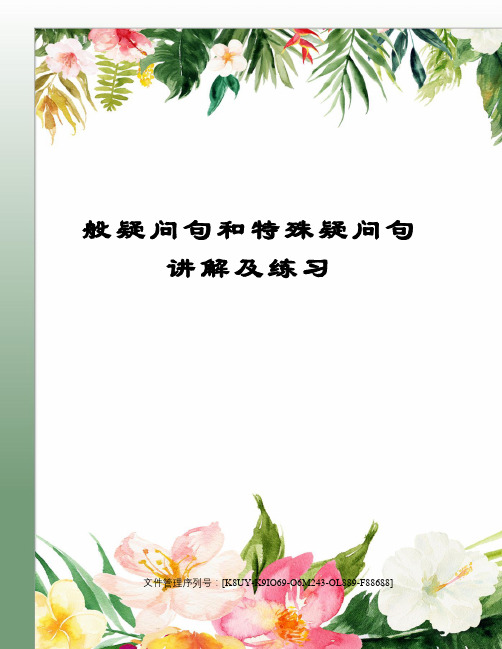
般疑问句和特殊疑问句讲解及练习文件管理序列号:[K8UY-K9IO69-O6M243-OL889-F88688]一般疑问句一、一般疑问句用Yes或No作答的疑问句叫一般疑问句。
其结构是be动词(am/is/are)//+主语+其他成分通常回答为:肯定:Yes,+主语+提问的词.否定:No,+主语+提问的词+not.AreyoufromJapan﹖Yes,Iam./No,I'mnot.Ishersisterdoingherhomeworknow﹖Yes,sheis./No,sheisn't.Doesheworkinabank﹖Yes,hedoes./No,hedoesn't.CanyouspeakFrench﹖Yes,Ican./No,Ican't.一.要将陈述句变成一般疑问句,可以遵循下列步骤:1.如句中有be动词(am、is、are、was、were)(can、may、must…)可直接将它们提到句首,句末打上问号即可。
主语为第一人称,应将其改为第二人称。
例:Itwasrainyyesterday.→WasitrainyyesterdayTom'sfathercanplaythepiano.→CanTom'sfatherplaythepiano2.如果句中没有be动词、助动词或情态动词,则根据谓语动词的形式借助do的相应形式放在句首。
具体方法是:如果谓语动词是原形,则借do;如果谓语动词是一般现在时第三人称单数形式,则借does;如果谓语动词是过去式,则借did.需要注意的是,借does或did后,原句的谓语动词要变回原形。
例:Theygotoschoolbybike.→DotheygotoschoolbybikeBillgetsupat6:30everyday.→Doesbillgetupat6:30everydayThestudentssawafilmyesterday.→Didthestudentsseeafilmyesterday二.陈述句变一般疑问句应注意的事项1.如果陈述句中有第一人称,则变问句时最好要变为第二人称。
日一般疑问句和特殊疑问句讲解及练习完整版

日一般疑问句和特殊疑问句讲解及练习集团标准化办公室:[VV986T-J682P28-JP266L8-68PNN]一般疑问句一、一般疑问句用Yes或No作答的疑问句叫一般疑问句。
其结构是be动词(am/is/are)//+主语+其他成分通常回答为:肯定:Yes,+主语+提问的词.否定:No,+主语+提问的词+not.AreyoufromJapan﹖Yes,Iam./No,I'mnot.Ishersisterdoingherhomeworknow﹖Yes,sheis./No,sheisn't.Doesheworkinabank﹖Yes,hedoes./No,hedoesn't.CanyouspeakFrench﹖Yes,Ican./No,Ican't.一.要将陈述句变成一般疑问句,可以遵循下列步骤:1.如句中有be动词(am、is、are、was、were)(can、may、must…)可直接将它们提到句首,句末打上问号即可。
主语为第一人称,应将其改为第二人称。
例:Itwasrainyyesterday.→Wasitrainyyesterday?Tom'sfathercanplaythepiano.→CanTom'sfatherplaythepiano?2.如果句中没有be动词、助动词或情态动词,则根据谓语动词的形式借助do 的相应形式放在句首。
具体方法是:如果谓语动词是原形,则借do;如果谓语动词是一般现在时第三人称单数形式,则借does;如果谓语动词是过去式,则借did.需要注意的是,借does或did后,原句的谓语动词要变回原形。
例:Theygotoschoolbybike.→Dotheygotoschoolbybike?Billgetsupat6:30everyday.→Doesbillgetupat6:30everyday?Thestudentssawafilmyesterday.→Didthestudentsseeafilmyesterday?二.陈述句变一般疑问句应注意的事项1.如果陈述句中有第一人称,则变问句时最好要变为第二人称。
小学一般疑问句和特殊疑问句和Be动词一般过去时讲解及练习
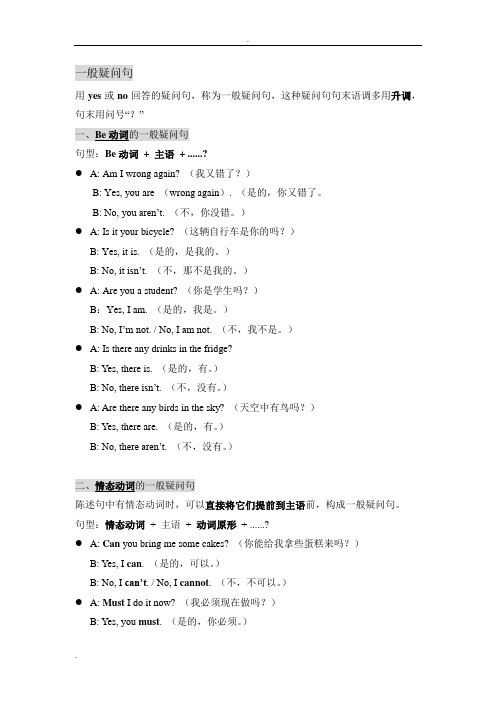
一般疑问句用yes或no回答的疑问句,称为一般疑问句,这种疑问句句末语调多用升调,句末用问号“?”句型:Be动词+ 主语+ ......?●A: Am I wrong again? (我又错了?)B: Yes, you are (wrong again). (是的,你又错了。
B: No, you aren’t. (不,你没错。
)●A: Is it your bicycle? (这辆自行车是你的吗?)B: Yes, it is. (是的,是我的。
)B: No, it isn’t. (不,那不是我的。
)●A: Are you a student? (你是学生吗?)B:Yes, I am. (是的,我是。
)B: No, I’m not. / No, I am not. (不,我不是。
)●A: Is there any drinks in the fridge?B: Yes, there is. (是的,有。
)B: No, there isn’t. (不,没有。
)●A: Are there any birds in the sky? (天空中有鸟吗?)B: Yes, there are. (是的,有。
)B: No, there aren’t. (不,没有。
)陈述句中有情态动词时,可以直接将它们提前到主语前,构成一般疑问句。
句型:情态动词+ 主语+ 动词原形+ ......?●A: Can you bring me some cakes? (你能给我拿些蛋糕来吗?)B: Yes, I can. (是的,可以。
)B: No, I can’t. / No, I cannot. (不,不可以。
)●A: Must I do it now? (我必须现在做吗?)B: Yes, you must. (是的,你必须。
)B: No, you needn’t. (不,你不必。
)(1)情态动词表示请求Can/Could you carry the heavy box for me? (你能帮我提一下这个重箱子吗?)Will/Would you please give me some butter? (你能给我一些黄油吗?)May I have some rice? (我可以吃一些米饭吗?)(2)情态动词表示邀请、建议Will you visit the museum next week? (你下周来参观博物馆好吗?)Would you like to go shopping with us? (你愿意和我们一起逛街购物吗?)Shall we go swimming? (我们一起去游泳好吗?)陈述句中只有行为动词时,一般疑问句要在句首加助动词do / does / did(过去式)句型:Do/Does/Did + 主语+ 动词原形+ ......?●A: Does he have supper at home every day?(他每天都在家吃晚饭吗?)B: Yes, he does. (是的,他是。
小学英语一般疑问句和特殊疑问句(附练习题)

小学英语一般疑问句和特殊疑问句(附练习题)一、一般疑问句一般疑问句是需要用Yes或No作答的疑问句。
它的特点是以be动词、助动词或情态动词开头,并且往往读升调。
要将陈述句变成一般疑问句,有两种方法。
如果陈述句中有be动词或情态动词,就将它们提到句首,句末加上问号即可。
如果句中没有这些动词,就在句首加上do的相应形式,并将原句的谓语动词变回原形。
需要注意的是,如果陈述句中有第一人称,变成疑问句时要变为第二人称。
而如果陈述句中有some,变成疑问句时往往要变成any。
回答一般疑问句时,如果问句主语是this或that,就用it代替;如果问句主语是these或those,就用they代替。
例如,如果问句是“Does she clean her room every day?”,回答可以是“Yes。
she does.”如果问句是“Is this your book?”,回答可以是“Yes。
it is.”1._______ is your favorite color?2._______ did you go on n?3._______ is your birthday?4._______ is your best friend?答案:1.What2.Where3.When4.Who二、改写句子1.His XXX.What was his father's job?2.XXX.Why are these cats crying?3.They can swim.What can they do?4.I went to school on foot.How did you go to school?5.His father goes to work by bus.How does his father go to work?6.Mrs。
Li and Kitty XXX.What can Mrs。
Li and Kitty do?7.Kitty is XXX.What is Kitty wearing?8.The two boys under the tree were hungry. Who was hungry under the tree?9.Mrs。
一般疑问句和特殊疑问句(附练习题及答案
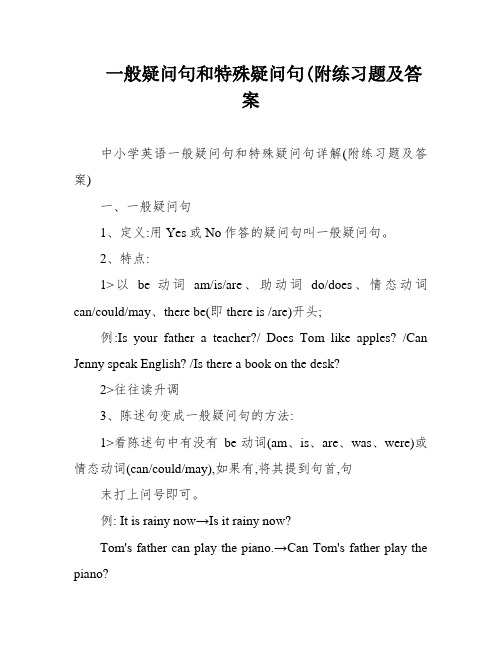
一般疑问句和特殊疑问句(附练习题及答案中小学英语一般疑问句和特殊疑问句详解(附练习题及答案)一、一般疑问句1、定义:用Yes或No作答的疑问句叫一般疑问句。
2、特点:1>以be动词am/is/are、助动词do/does、情态动词can/could/may、there be(即there is /are)开头;例:Is your father a teacher?/ Does Tom like apples? /Can Jenny speak English? /Is there a book on the desk?2>往往读升调3、陈述句变成一般疑问句的方法:1>看陈述句中有没有be动词(am、is、are、was、were)或情态动词(can/could/may),如果有,将其提到句首,句末打上问号即可。
例: It is rainy now→Is it rainy now?Tom's father can play the piano.→Can Tom's father play the piano?There is a book on the desk.→Is th ere a book on the desk?2>如果句中没有be动词或情态动词,句首加do的相应形式(do、does、did),且原句的谓语动词要变回原形。
1.They go to school by bike.→Do they go to school by bike?2.Bill gets up at 6:30 every day.→Does bill gets up at 6:30 every day?3.The students saw a film yesterday.→Did the students see a film yesterday?注: 1)如果陈述句中有第一人称,则变问句时要变为第二人称。
一般、特殊、选择疑问句专题讲解(附习题答案)
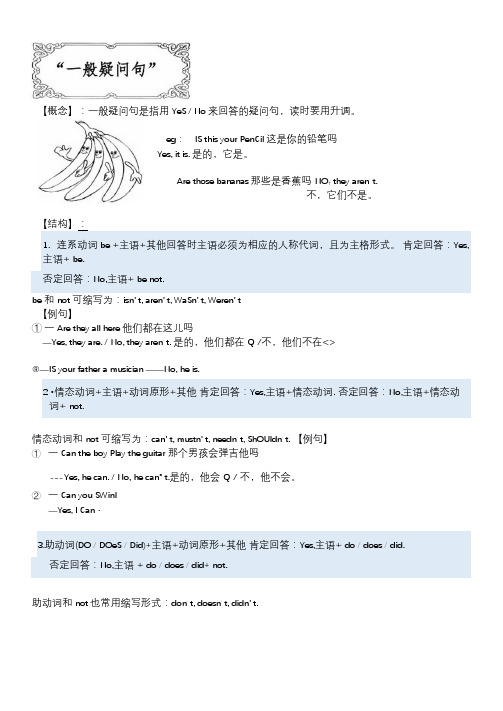
【概念】:一般疑问句是指用YeS / No来回答的疑问句,读时要用升调。
eg:IS this your PenCil 这是你的铅笔吗Yes, it is. 是的,它是。
Are those bananas那些是香蕉吗N O T they aren, t.不,它们不是。
【结构】:1.连系动词be +主语+其他回答时主语必须为相应的人称代词,且为主格形式。
肯定回答:Yes,主语+ be.否定回答:No,主语+ be not.be 和not 可缩写为:isn' t, aren' t, WaSn' t, Weren' t【例句】①一Are they all here他们都在这儿吗—Yes, they are. / No, they aren, t. 是的,他们都在Q /不,他们不在<>®—IS your father a musician ——No, he is.2 •情态动词+主语+动词原形+其他肯定回答:Yes,主语+情态动词. 否定回答:No,主语+情态动词+ not.情态动词和not 可缩写为:can' t, mustn' t, needn, t, ShOUIdn, t. 【例句】①一Can the boy Play the guitar 那个男孩会弹吉他吗--- Yes, he can. / No, he can" t.是的,他会Q / 不,他不会。
②一Can you SWinl—Yes, I Can・3.助动词(DO / DOeS / Did)+主语+动词原形+其他肯定回答:Yes,主语+ do / does / did.否定回答:No,主语 + do / does / did+ not.助动词和not也常用缩写形式:don, t, doesn, t, didn' t.【例句】①一DO you Want to go to the movie你想去看电影吗一Yes, I do. / No, I don, t.是的,我想去。
一般疑问句和特殊疑问句讲解及练习

一般疑问句一、一般疑问句用Yes或No作答的疑问句叫一般疑问句。
其结构是be动词(am /is /are )/助动词/情态动词+主语+其他成分通常回答为:肯定:Yes, +主语+提问的词.否定:No, +主语+提问的词+not.Are you from Japan? Yes ,I am. / No, I'm not.Is her sister doing her homework now? Yes, she is / No, she isn't.Does he work in a bank? Yes, he does / No, he doesn'tCan you speak French Yes, I can. / No, I can't.一般疑问句还有下列特点:1、以be动词、助动词或情态动词开头;例:Is your father a teacher? Does Catherine like animals? Can Jenny speak French?2、2、往往读升调;3、译成汉语,都可以带上吗”,例如上面三句可分别译为:你父亲是老师吗?凯瑟琳喜欢动物吗?詹妮会说法语吗?二、例何将陈述句变成一般疑问句?要将陈述句变成一般疑问句,可以遵循下列步骤:1.如句中有be 动词(am、is、ar& was、were)情态动词(can、may、must ■■■)或助动词(do、does、did、hav& had (完成时中))时,可直接将它们提到句首,句末打上问号即可。
主语为第一人称,应将其改为第二人称。
例:It was rainy yesterday.t Was it rainy yesterday?Tom's father can play the piano.t Can Tom's father play the piano?I have finished my homework.t Have you finished your homework?2.如果句中没有be动词、助动词或情态动词,则根据谓语动词的形式借助do的相应形式放在句首。
- 1、下载文档前请自行甄别文档内容的完整性,平台不提供额外的编辑、内容补充、找答案等附加服务。
- 2、"仅部分预览"的文档,不可在线预览部分如存在完整性等问题,可反馈申请退款(可完整预览的文档不适用该条件!)。
- 3、如文档侵犯您的权益,请联系客服反馈,我们会尽快为您处理(人工客服工作时间:9:00-18:30)。
一般疑问句一、一般疑问句用Yes或No作答的疑问句叫一般疑问句。
其结构是be动词(主语+其他成分通常回答为:肯定:Yes,+主语+提问的词.否定:No,+主语+提问的词+not.AreyoufromJapan﹖Yes,Iam./No,I'mnot.Ishersisterdoingherhomeworknow﹖Yes,sheis./No,sheisn't.Doesheworkinabank﹖Yes,hedoes./No,hedoesn't.CanyouspeakFrench﹖Yes,Ican./No,Ican't.1.如句中有be动词(am、is、are、was、were can、may、must…)可直接将它们提例:Itwasrainyyesterday.→Wasitrainyyesterda yTom'sfathercanplaythepiano.→CanTom'sfatherplaythepiano2.如果句中没有be动词、助动词或情态动词,则根据谓语动词的形式借助do的相应形式放在句首。
具体方法是:如果谓语动词是原形,则借do;如果谓语动词是一般现在时第三人称单数形式,则借does;如果谓语动词是过去式,则借did.需要注意的是,借does或did后,原句的谓语动词要变回原形。
例:Theygotoschoolbybike.→DotheygotoschoolbybikeBillgetsupat6:30everyday.→Doesbillgetupat6:30everydayThestudentssawafilmyesterday.→Didthestudentsseeafilmyesterday二.陈述句变一般疑问句应注意的事项1.如果陈述句中有第一人称,则变问句时最好要变为第二人称。
例:Iusuallyhavelunchatschool.→DoyouusuallyhavelunchatschoolMyfatherisplayingsoccer.→Isyourfatherplayingsoccer2.如果陈述句中有some,则变问句时往往要变成any。
例:Thereissomewaterontheplayground.→Isthereanywaterontheplayground3.复合句变一般疑问句通常只变主句,从句不变。
例:IknowhecomesfromCanada.→DoyouknowhecomesfromCanada4.如果句中含实义动词have且表示“有”时,除借do外,也可将其直接提到句首。
例:IhavesomefriendsinAmerica.→HaveyouanyfriendsinAmerica/DoyouhaveanyfriendsinAmerica三.一般疑问句的回答1.第一个词:不是Yes就是No。
(有时根据语气的不同,Yes可由Sure,Certainly,Ofcourse等代替.NO可由sorry代替.)2.第二个词:问谁答谁。
即答语中的主语须与问句的主语一致(必须用主格代词)。
例:DoesshecleanherroomeverydayYes,shedoes.IsAnna′sfatheradoctorNo,heisn′t.如果主语是thisthat,回答时用it代替。
IsthisyourpenYes,itis.No,itisn't.如果问句中主语these,those,回答时用they代替。
ArethoseyourbooksYes,theyare.No,theyaren't.3.第三个词:用什么问,用什么答。
即用问句中的提问词。
CanJimplaysoccerYes,hecan.DoesMrBeanspeakEnglishYes,hedoes.需注意问题:用may引导的问句,肯定回答用may,否定回答用can′t或mustn′t,用must引导的问句,肯定回答用must,否定回答用needn′t/don’thaveto例:MayIgototheparknowYes,youmay./No,youmustn′t.MustIwashmyclothesnowYes,youmust./No,youneedn′t.4.作否定回答时,结尾要加上not。
否定回答最好缩写,而肯定回答不能缩写。
例:DidThomascomehereyesterdayYes,hedid./No,hedidn′t.IsLinLininClass3Yes,sheis./No,sheisn′t.特殊疑问句以疑问词开头,对句中某一成分提问的句子叫特殊疑问句。
常用的疑问词有:what(什么),who(谁),whose(谁的),which(哪个),when(何时),where(哪里),how(怎样,通过...),why(为何)等。
特殊疑问句有两种语序:1.如疑问词作主语或主语的定语,即对主语或主语的定语提问,其语序是陈述句的语序:疑问词(+主语)+谓语动词+其他成分?如:whoissingingintheroom﹖whosebikeisbroken﹖2.如疑问词作其他成分,即对其他成分提问,其语序是:疑问词+一般疑问句语序?如:whatclassareyouin﹖Whatdoesshelooklike﹖Whereareyoufrom﹖Whattimedoeshegetupeverymorning﹖Howdoyouknow﹖注意:1.回答特殊疑问句时,不能用yes/no,即问什么答什么,尤其是简略回答。
如:WhoisfromCanada﹖Helen(is).Where'stherestaurant﹖Nearthestation.Whydoyoulikekoalas﹖Becausetheyarecute.一、陈述句变一般疑问句1.HisfatherisanEnglishteacher.___________________________________________2.Thesecatsarecrying.(喊叫)___________________________________________3.Theycanswim.___________________________________________4.Iliketoread(阅读)English.___________________________________________5.Igotoschoolonfoot.(走路)___________________________________________6.Thechildrenhadagoodtimeinthepark(公园).___________________________________________7.Hisfathergoestoworkbybus.(乘公共汽车)___________________________________________8.Theboyunderthetree(树)ishungry.(饥饿)___________________________________________9.Hegoestoschooleveryday.___________________________________________10.Iwanttohaveamodelcar(摩托车).___________________________________________11.Mrs.LiandKittywatchTVatnight(在晚上).___________________________________________12Theboydoessomehousework(家庭作业)athome.___________________________________________二、把肯定句变为否定句1.HisfatherisanEnglishteacher.____________________________________________.2.Thesecatsarecrying.(喊叫)____________________________________________.3.Theycanswim.____________________________________________.4.Hisfathergoestoworkbybus.(乘公共汽车)_______________________________________________.5.Tomhassomeapples.___________________________________________.6.Thechildrenhadagoodtimeinthepark(公园).___________________________________________.7.Mrs.LiandKittywatchTVatnight(在晚上).___________________________________________.8.Theboydoessomehousework(家庭作业)athome.___________________________________________.三、作肯定和否定回答1、Isthisyourpencil-case肯定回答:___________________.否定回答:___________________.2、Isthathisbackpack肯定回答:___________________.否定回答:___________________.3、Aretheseherbrothers肯定回答:___________________.否定回答:___________________.4、ArethoseTom’sparents肯定回答:___________________.否定回答:___________________.5、Canyouplaytheguitar肯定回答:___________________.否定回答:___________________.6、DotheylikeFrenchfries肯定回答:___________________.否定回答:___________________.7、Doeshelikepears肯定回答:___________________.否定回答:___________________.8、MayIaskyourquestion肯定回答:___________________.否定回答:___________________.9、Isheyourfather肯定回答:___________________.否定回答:___________________.10、AreyoufromChina.肯定回答:___________________.否定回答:___________________.特殊疑问句习题:就划线部分提问1.Theyboughtanewbikeyesterday.____________________________________________________2.Sheismyteacher.___________________________________3.Itismycoat.______________________________________4.Iamlookingformysister.____________________________________________________5.Igetupatsix.____________________________________________________6.IamfromHubei.__________________________________________________7.IwenttoschoollatebecauseIgotuplate.____________________________________________________8.Iamgettingonwellwithit.____________________________________________________9.Mybagisred._______________________________________10.Theyarefiveyuan.______________________________________________________11.Iwashittwiceaweek.______________________________________________________12.Hewillbebackinfourdays._一般将来时一、单项选择2.He________herabeautifulhatonhernextbirthday.A.givesB.gaveC.willgivingD.isgoingtogive34.–WillhisparentsgotoseetheTerraCottaWarriorstomorrow–No,________(不去).A.theywilln’tB.theywon’t.C.theyaren’tD.theydon’t.5.Who________we________swimmingwithtomorrowafternoonA.will;goB.do;goC.will;goingD.shall;go6.We________theworkthiswaynexttime.A.doB.willdoC.goingtodoD.willdoing7.Tomorrowhe________akiteintheopenairfirst,andthen________boatinginthepark.A.willfly;willgoB.willfly;goesC.isgoingtofly;willgoesD.flies;willgo89.There________abirthdaypartythisSunday.A.shallbeB.willbeC.shallgoingtobeD.willgoingtobe1011.He________thereattentomorrowmorning.A.willB.isC.willbeD.be12.It________theyearofthehorsenextyear.A.isgoingtobeB.isgoingtoC.willbeD.willis13.________openthewindowA.WillyoupleaseB.PleasewillyouC.YoupleaseD.Doyou14.It________usalongtimetolearnEnglishwell.A.takesB.willtakeC.spendsD.willspend15.Thetrain________at11.A.goingtoarriveB.willbearriveC.isgoingtoD.isarriving二、用所给动词的一般将来时填空1.I______(leave)inaminute.I______(finish)allmyworkbeforeI______(leave).2.Iamafraidthere___________(be)ameetingthisafternoon.Ican’tjoinyou.3.I___________(be)tired.I___________(go)tobedearlytonight.4.Mary’sbirthdayisnextM onday,hermother_______________(snow)soon. 6.—__________you__________(be)herethisSaturday—No.I___________(visit)myteacher.7.—__________I________(get)youacopyoftoday’snewspaper—Thankyou.情态动词1.—Mustweleavenow—No,we_______.Westillhavetwomorehours.A.can’tB.mustn’tC.needn’tD.shouldn’t2.—Canyourideahorse—No.I____.3.Youeatthesoupifyoudon'tlikeit.A.shouldn'tB.mustn'tC.needn'tD.can't4._____youwaitafewmoreminutesIt'llbeyourturnsoon,A.5.She_______behere.Isawhercomein.6.Ican’tgotothecinemawithyoubecauseI___________stayhereuntilmymotherc omesback.7.—Bequiet,Mr.Smithiscoming.—Don’tworry.It___behim.Mr.Smithismuchtaller.A.mustn’tB.mustC.can’t8.—Hey,Ted!You_______neverplayinthestreet.It’snotsafe.—Sorry,Mum.Iwon’tagain.A.needB.mustC.canD.may9.—HowlongmayIkeepthebook—You________keepitfortwoweeks.C.will10.—MayIsmokehere,please—Iamafraidyou.Thisisanon-smokingarea.A.canB.can’t C.mayD.maynot11.—MustIreturnthebookthisweek—No,you____.Youcan_itfor20days.A.mustn’t;keepB.needn't;borrowC.needn't;keepD.mustn't;borrow12.—CouldIuseyoureraserforawhile—Yes,ofcourseyou_.13—________IwatchTVnow,Mom—No.It’stoolate,andyou______gotobed.A.May;havetoB.Will;shouldC.Can;willD.Must;need14.—MustIfinishmyhomeworktoday,MsLiu—No,_______.A.youmustn’tB.youdon’thavetoC.youcan’t15.Accordingtothenewtrafficlaws,people______driveafterdrinkingwineorbe er.A.wouldn’tB.couldn’tC.needn’tD.mustn’t16.—Who’ssinginginthenextroom—It____beher.ShehasgonetoNewYork.A.can’tB.mustC.shouldn’tD.can。
